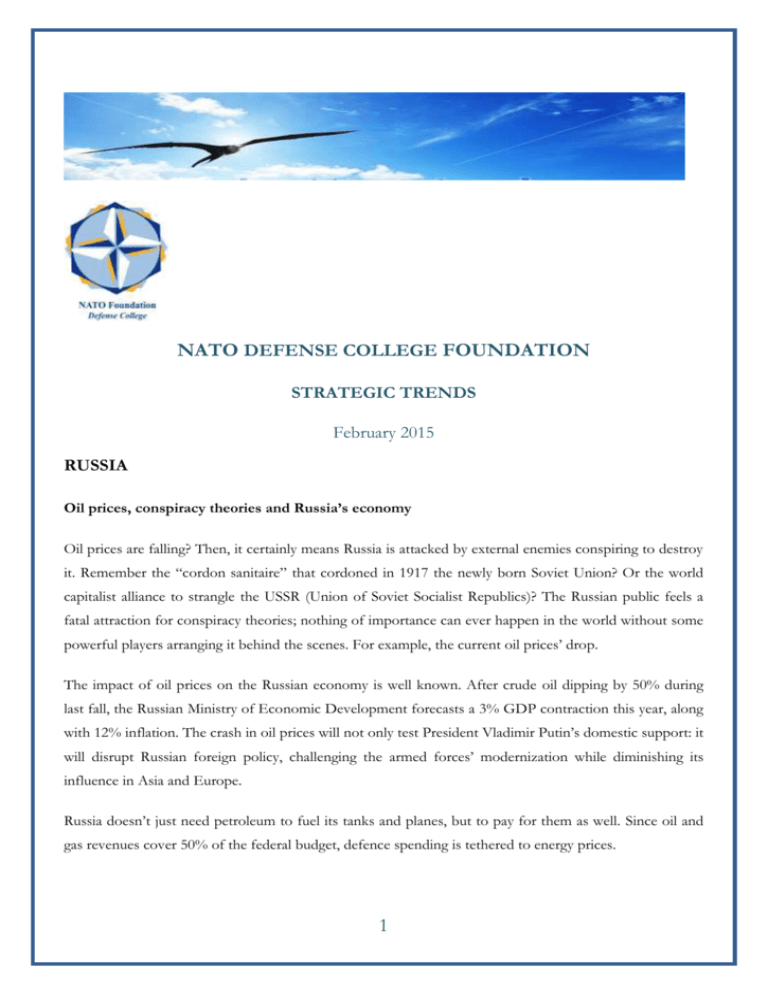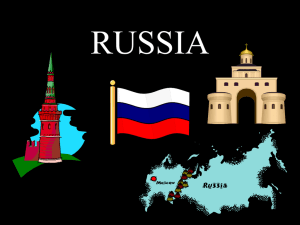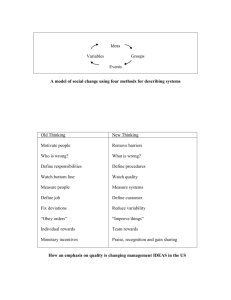- NDC Foundation
advertisement

NATO DEFENSE COLLEGE FOUNDATION STRATEGIC TRENDS February 2015 RUSSIA Oil prices, conspiracy theories and Russia’s economy Oil prices are falling? Then, it certainly means Russia is attacked by external enemies conspiring to destroy it. Remember the “cordon sanitaire” that cordoned in 1917 the newly born Soviet Union? Or the world capitalist alliance to strangle the USSR (Union of Soviet Socialist Republics)? The Russian public feels a fatal attraction for conspiracy theories; nothing of importance can ever happen in the world without some powerful players arranging it behind the scenes. For example, the current oil prices’ drop. The impact of oil prices on the Russian economy is well known. After crude oil dipping by 50% during last fall, the Russian Ministry of Economic Development forecasts a 3% GDP contraction this year, along with 12% inflation. The crash in oil prices will not only test President Vladimir Putin’s domestic support: it will disrupt Russian foreign policy, challenging the armed forces’ modernization while diminishing its influence in Asia and Europe. Russia doesn’t just need petroleum to fuel its tanks and planes, but to pay for them as well. Since oil and gas revenues cover 50% of the federal budget, defence spending is tethered to energy prices. 1 The slump comes at a particularly awkward time for the military. Even if its resources were not being consumed in eastern Ukraine, Russia’s ongoing initiative to improve its armed forces is extremely costly, with defence expenditures set to soar 44% from 2013 to 2016. Shrinking energy revenues are now curtailing those ambitions by constraining the budget. According to Finance Minister Anton Siluanov, the slump will deprive the Kremlin of $180 billion in 2015 alone. Oil prices are a subject particularly beloved by Russian conspiracy theorists. Ulyana Skoibeda, a columnist at the Komsomolskaya Pravda newspaper, once wrote that “the West strangled the Soviet Union by holding down oil prices the way a murderer holds his victim’s head under water”. In Russia there is a broadly based consensus that former US President Ronald Reagan struck a deal with the Saudis that resulted in a terminal economic crisis in the Soviet Union and the collapse of communism. Today, both opponents and supporters of Russian President Vladimir Putin are convinced that US President Barack Obama did the same, leading to the present drop in oil prices. Never mind that during the 1980s OPEC lost its dominance, that no one has been overwhelmingly controlling the oil market, or that even the task of forecasting oil prices accurately has eluded highly trained, well-paid economists at major oil companies. Nor does it matter that, given rational economic policies, lower oil prices could have a positive impact on the Russian economy in the medium/long term, just as falling oil production put impoverished Mexico and Indonesia on the path to economic development. But oil prices are falling and, absent a group of shady characters fixing them in a cigar-smoke-filled room in Washington or Riyadh, the question remains why this is happening and where the prices will go from now on. The reason for the slump is simple: technology has come to dominate oil markets and set prices. Economic history is the history of technological progress. Oil is a special commodity, but it is subject to the same technology laws. Demand for oil emerged a century ago with the invention of the car and spreading of electricity. Initially it was simply pumped out of the ground, and countries that were lucky enough to have large deposits were the main beneficiaries. Over the past 15 years, high oil prices brought the high-tech revolution to bear on the oil market. It impacted the supply of oil — by developing technologies to get the oil that previously could not be extracted. It impacted demand by creating more efficient engines, lighter materials and electric cars. Finally, new sources of energy and oil substitutes were developed. 2 Market critical mass was achieved last year, when the US, thanks to the shale oil boom, became the world’s largest oil producer. In fact the process started years before, thanks to new technologies for producing shale gas, such as hydrofracking and horizontal drilling; technologies now largely applied to conventional oil too in the United States. Historically, technology has been getting steadily cheaper and the US production is the main cause of the actual overproduction. This means that oil prices, while fluctuating, are now going to be under constant pressure. Worse, any temporary upticks will fund a new technological spiral, leading to a renewed decline in prices. Bad news for Moscow. Oil prices are falling? Then, shame on Russia that never seriously tried to diversify its oil/gasbased economy. 3











